Methionine/Cysteine restriction increases longetivity AND energy expenditure
-
@DavidPS
Sorry for the confusion as well.
The 800% increase in FGF21 was actually from the high carb diet. And as the person in the video you posted explained, they ate pasta, bread, corn and drank juices.Im going to look into that study more, mainly because it is a human study and the increase was so high.
Now compare that to the low protein study (also in humans) and they only had a 150% increase after 4 weeks.So it seems high carb is more important than low protein!
-
@Mauritio said in Methionine/Cysteine restriction increases longetivity AND energy expenditure:
@DavidPS
Sorry for the confusion as well.
The 800% increase in FGF21 was actually from the high carb diet. And as the person in the video you posted explained, they ate pasta, bread, corn and drank juices.Im going to look into that study more, mainly because it is human and the increase is so high.
Now compare that to the low protein study (also in humans) and they only had a 150% increase after 4 weeks.So it seems high carb is more important than low protein!
This is actually an excellent study. Aswers a lot of questions.
Again: high carb, seems more important than low protein. And low fat (PUFA) is important, too.
They used the following diets:
High carb: (80 E% carbohydrate, 11 E% protein, 9 E% fat)
High fat: (10 E% carbohydrate, 12 E% protein, 78 E% fat)
Control: (62 E% carbohydrates, 14 E% protein, 24 E% fat)The dfference in FGF21 between high carb and control is massive, yet the control group also ate a lot of carbs and the protein was almost the same, so the only factor that strongly differs is the fat content, which is 2,5 times higher in the control diet.
Leading me to believe that this is crucial as well: high carb AND low fat. If it was only the carbs than the control diet should have outperformed the high fat diet ,which it didn't.This underlines what Peat said for a long time that: a high carb, low/medium protein, low fat is very healthy.
I think you can go higher on protein if it is gelatin. And maybe higher on fat if it is SFA ? Im going to look into the realtionship between SFA and FGF21.Another thing we should look into is all the protein restriction animal studies.
Are they really low protein studies ? Or high carb,low protein?What is the diet of the control groups in these studies?Btw fasting is not effective in humand to boost FGF21: "...an increase in circulating FGF21 concentration is not detected until after 7–10 days of starvation in humans ..."
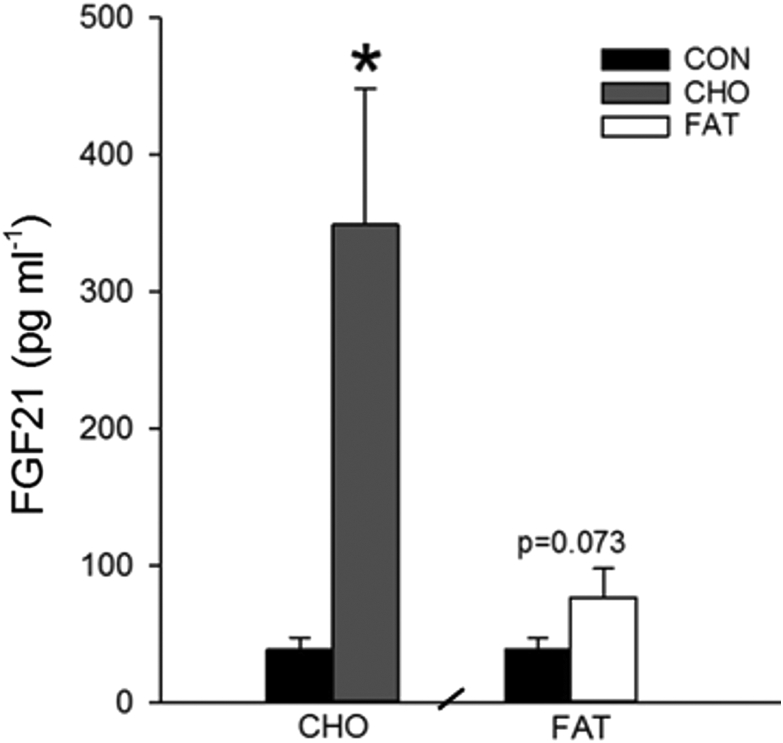
-
This study shows that the type of carbohdyrate matters: sucrose is superior to starch, in terms of FGF21.
Eventhough the 2 experimental diets have on paper the same ratio of carbs, protein and fat, they have very different outcomes. The group that had a higher sucrose ratio in their carbs had a higher metabolism, much higher UCP and FGF21, lower triglycerides, etc...
This makes the results of the above mentioned human study even more impressive, since they ate a lot of starch but managed to increase FGF21 by 800%. It probably would have been even more, if they had eaten more sucrose and less starch.
-
This study(https://pubmed.ncbi.nlm.nih.gov/25133427/#:~:text=FGF21 therefore represents an endocrine,periods of reduced protein intake.) makes the necessary diet even clearer.
In indivuduals that ate the same carbs but differing protein(and fat) contents, they showed that only the low protein group had an increase in FGF21 of about 170%So low protein, does work for increasing FGF21, but not nearly as well as high carb (and low protein). And it does work despite fat beeing at 52% of total calories. So itsnt impossible to increase FGF21 while eating high fat. I just suspect that high carb, low fat, low protein is the ideal diet for that.
Low protein,medium fat ,medium carbs: +170%
Low protein,high carb, low fat : +800% -
- You can also go too low in methionine. Going as low as 0.1% in M ,resulted in death at least in many mice
"The following year, Miller et al. (80) examined the effect of MR on longevity in postweaning female BALB/cJ × C57BL/6J F1 mice using a lower concentration of methionine (e.g., 0.1% versus 0.17%). Many mice in the MR group died of rectal prolapse, so the methionine concentration was increased to 0.12% at 4 months of age, and then again to 0.15% at 6 months of age."
- 6h hours is not a lot for a 5-fold increase! So even a short term exposure to MR should have a lot of benefits! Lets say eating most of your proteins during one time of the day. IIRC there was a study showing almost the same benefits when they only did 3 days of MR per week.
"The next important advance came with the demonstration that, within 6 h of initial exposure to the MR diet, hepatic expression and circulating levels of FGF21 were increased fivefold in mice consuming the MR diet (118, 130). "
- As Peat said cysteine is also to be restricted!
"A second line of evidence comes from studies showing that adding back small amounts of cysteine to the MR diet reversed the diet’s induction of hepatic FGF21 but did not abrogate the ability of the MR diet to downregulate lipogenic genes in the liver (130)."
"The addition of 0.2% cysteine completely reversed the ability of the 0.17% methionine diet to increase EE and reduce fat mass (130)."
- The concentrations of methionine and cysteine have to be dialed in pretty wel, to achieve the desired effect.
Although in the human studies they mostly didst control for methionine content AFAIK, but only protein content, which was always around 10%, so that seesm to be enough to get at least some of the effects of the animal studies.
"Methionine concentrations above 0.25% produce very little response, concentrations between 0.12% and 0.25% are ideal for improving metabolic biomarkers, and concentrations below 0.12% represent deprivation and will not sustain life. Concentrations of methionine between 0.15% and 0.20% seem to provide the best combination of reduced adiposity without significant weight loss (Figure 4). "
-
Intermittent protein restriction might be a thing and reversed diabetes progression in this study.
They had one group that ate: 3 days low protein, followed by 4 days of a normal diet. And one group that ate 3 days low ,followed by 2 days high, followed by 2 days of normal protein. I think the most effective low protein concentration was 5%.
In terms of effects the 3-2-2 diet was slighlty superior the 3-4 diet. So a high protein window does not "ruin" the benefits of the previous low protein window.This image is interesting since it shows that even a single day of a low protein diet per week might be beneficial. But the more days the better ( at least up until 3 days/w, they didnt test for more)
In image (b) you can see that the 3-4 and the 3-2-2 diet resulted in about a 10-fold increase in FGF21 after 13 weeks. That is the biggest increase I have seen so far.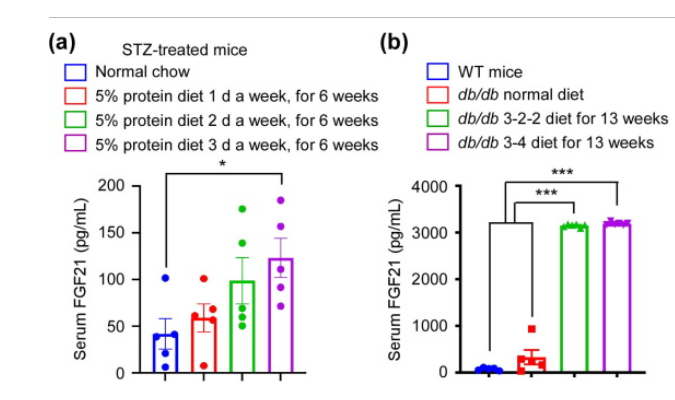
They looked at continous protein restriction and while that caused weight loss and was good for diabetes it seemed to cause liver abnormalities (high triglycerides, high liver enzymes,...), so that is weird. Maybe 5% was too low continously?
https://www.sciencedirect.com/science/article/pii/S2095927321008033?via%3Dihub
-
This is interesting research, I'm glad it's being discussed here. Anecdotally, when I was doing protein restriction a couple years ago I actually felt very good while doing it, and I wasn't even on thyroid during this period. I came to the conclusion that the "low-protein" aspect was more beneficial than the "low-fat" aspect of it. Though I'd imagine they both synergistically aid to some extent.
What set me on that path was stumbling upon some studies that suggested low-protein diets can reduce CRH and ACTH output, and thus quiet that negative feedback loop of stress hormones. I couldn't go long without eating because my liver was malfunctioning and not holding glycogen well.
The low protein diet seemed to stop (or slow down) the gluconeogenesis and subsequent stress response, as I wouldn't get the low blood-sugar "shakes" anymore, however I ran into a new problem of never seeming to get full. I was basically always thinking about food, even after eating. I guess because a almost pure carbohydrate diet doesn't really hit that satiety factor as much as a higher protein diet does, idk.
After successfully implementing thyroid into my regime I can handle higher protein much better, but I do believe a low-protein diet can partially alleviate many of the main issues associate with hypothyroidism if you can stick to it. I'm not really interested in going full low-protein again, but it would be nice to find a complete list of all the high methionine foods, because avoiding methionine and cysteine would be something I'd do, along with tryptophan.
-
According to the study below, avoiding continuous dieting may be the key to losing weight and keeping it off, say nutrition scientists, but traditional intermittent fasting regimens such as the popular 5:2 diet are not the way to do it.
The findings from a randomized controlled trial, including 51 obese men, show that taking a two-week break from energy restriction appears to be critical to success. Those who take a break from dieting lose on average 47% more weightthan the continuous dieters and 80% more weight at six-month follow-up.
In the current study, intermittent dieters achieve “superior weight loss”, the researchers say. Two groups of participants took part in the 16-week trial, which cutcalorie intake by one-third. One group maintained the diet continuously while the other dieted for two weeks and then stopped for two weeks, eating simply to keep their weight stable, andrepeated this cycle for 30 weeks to ensure 16 weeks of dieting. The researchers report that those in the intermittent diet group not only lost more weight, but also gained less weight after the trial finished. “Although both groups regained weight post-intervention,weight loss (reduction from baseline) was on average 8.1kg greater inthe intermittent group than the continuous group at six-monthfollow-up,”
Intermittent energy restriction improves weight loss efficiency in obese men: the MATADOR study
The MATADOR (Minimising Adaptive Thermogenesis And Deactivating Obesity Rebound) study examined whether intermittent energy restriction (ER) improved weight loss efficiency compared with continuous ER and, if so, whether intermittent ER attenuated compensatory responses associated with ER.
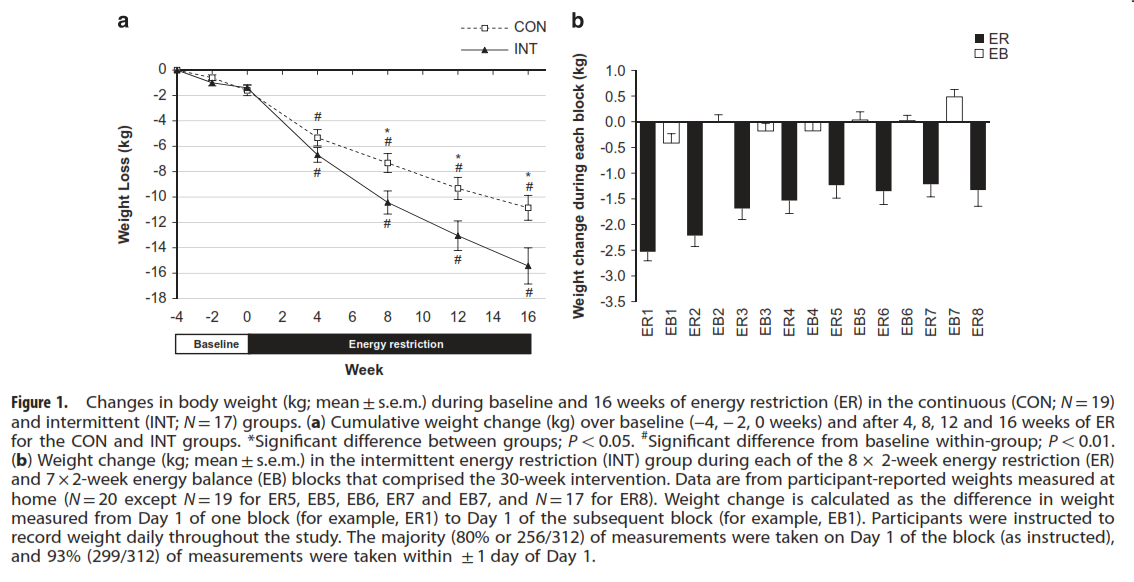
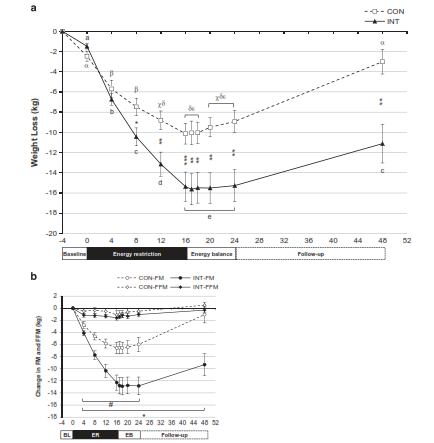
-
@Mulloch94 said in Methionine/Cysteine restriction increases longetivity AND energy expenditure:
This is interesting research, I'm glad it's being discussed here. Anecdotally, when I was doing protein restriction a couple years ago I actually felt very good while doing it, and I wasn't even on thyroid during this period. I came to the conclusion that the "low-protein" aspect was more beneficial than the "low-fat" aspect of it. Though I'd imagine they both synergistically aid to some extent.
What set me on that path was stumbling upon some studies that suggested low-protein diets can reduce CRH and ACTH output, and thus quiet that negative feedback loop of stress hormones. I couldn't go long without eating because my liver was malfunctioning and not holding glycogen well.
The low protein diet seemed to stop (or slow down) the gluconeogenesis and subsequent stress response, as I wouldn't get the low blood-sugar "shakes" anymore, however I ran into a new problem of never seeming to get full. I was basically always thinking about food, even after eating. I guess because a almost pure carbohydrate diet doesn't really hit that satiety factor as much as a higher protein diet does, idk.
After successfully implementing thyroid into my regime I can handle higher protein much better, but I do believe a low-protein diet can partially alleviate many of the main issues associate with hypothyroidism if you can stick to it. I'm not really interested in going full low-protein again, but it would be nice to find a complete list of all the high methionine foods, because avoiding methionine and cysteine would be something I'd do, along with tryptophan.
If you dont want to go full low protein, maybe just 2 days a week is doable. If you look at image (a) in the post above, you can see that even 2 days a week at 5% protein caused FGF21 to more than double. And 5% might not even be necessary in rat and the human studies they mostly used 10% which is about 50-75g of protein for most people. Although that sounds more than it is.
How much protein and fat did you eat during those days?
-
@Mauritio said in Methionine/Cysteine restriction increases longetivity AND energy expenditure:
@Mulloch94 said in Methionine/Cysteine restriction increases longetivity AND energy expenditure:
This is interesting research, I'm glad it's being discussed here. Anecdotally, when I was doing protein restriction a couple years ago I actually felt very good while doing it, and I wasn't even on thyroid during this period. I came to the conclusion that the "low-protein" aspect was more beneficial than the "low-fat" aspect of it. Though I'd imagine they both synergistically aid to some extent.
What set me on that path was stumbling upon some studies that suggested low-protein diets can reduce CRH and ACTH output, and thus quiet that negative feedback loop of stress hormones. I couldn't go long without eating because my liver was malfunctioning and not holding glycogen well.
The low protein diet seemed to stop (or slow down) the gluconeogenesis and subsequent stress response, as I wouldn't get the low blood-sugar "shakes" anymore, however I ran into a new problem of never seeming to get full. I was basically always thinking about food, even after eating. I guess because a almost pure carbohydrate diet doesn't really hit that satiety factor as much as a higher protein diet does, idk.
After successfully implementing thyroid into my regime I can handle higher protein much better, but I do believe a low-protein diet can partially alleviate many of the main issues associate with hypothyroidism if you can stick to it. I'm not really interested in going full low-protein again, but it would be nice to find a complete list of all the high methionine foods, because avoiding methionine and cysteine would be something I'd do, along with tryptophan.
If you dont want to go full low protein, maybe just 2 days a week is doable. If you look at image (a) in the post above, you can see that even 2 days a week at 5% protein caused FGF21 to more than double. And 5% might not even be necessary in rat and the human studies they mostly used 10% which is about 50-75g of protein for most people. Although that sounds more than it is.
How much protein and fat did you eat during those days?
I was hitting around 50 grams during my experiment. I ate mostly baked potatoes (around 2 pounds per day) with fresh salsa. I also made some rice pudding with skim milk, but kept it to one serving per day because I didn't want the milk to give me too much protein. I could probably do this diet again on a limited 2 day weekly basis with no issues at all.
Even now though, I do think I've managed to restrict methionine despite increasing total protein consumption. I didn't exactly plan it out that way (I was more focused on tryptophan), but my main sources of protein now are BCAA's in a morning smoothie with milk and fruit, casein in my afternoon oatbran, and something like hamburger or oxtail for dinner which might be high in methionine but it's got plenty of glycine in it too.
-
@Mulloch94 said in Methionine/Cysteine restriction increases longetivity AND energy expenditure:
Reply
Nice, ice cream has only about 2g of protein per 100g. So that is good thing to consider.
Did you notice any issues with libido or muscle strength?I'm wondering about craving too. Im sure you were craving meat at some point , then wouldnt that be a sign that your body needs it ? Not sure, but that would speak for the intermitten approach as well.
-
@Mauritio said in Methionine/Cysteine restriction increases longetivity AND energy expenditure:
Nice, ice cream has only about 2g of protein per 100g. So that is good thing to consider.
Yeah, at the time is was doing both low-protein and low-fat. But I have been wondering how well I might respond to a low-protein diet that doesn't emphasize low-fat as well. So I might give ice cream a try too. I'm interested to know whether my satiety is effected if I don't lower fat with my protein.
@Mauritio said in Methionine/Cysteine restriction increases longetivity AND energy expenditure:
Did you notice any issues with libido or muscle strength?
I did notice I would get gassed quicker on my deadlifts and squats. I didn't notice much difference in sexual performance. I wasn't in a active relationship so I wasn't getting laid frequently. My guess is someone who has a more restricted refractory period between encounters might notice a difference. But I've also read higher-protein diets increase PRL (prolactin), so maybe a lower protein diet is actually beneficial in this regard?
@Mauritio said in Methionine/Cysteine restriction increases longetivity AND energy expenditure:
I'm wondering about craving too. Im sure you were craving meat at some point , then wouldnt that be a sign that your body needs it ? Not sure, but that would speak for the intermitten approach as well.
This is something I've heavily considered as well. My personal opinion is if someone does heavy protein restriction for many years they may begin to slowly breakdown muscle tissue. You can look at some of those life-long vegans who eat starch based diets (like 80% carbs) and they're all small and bony. But, like you said, if you only eat that way intermittently this probably won't happen. Low-protein reduces the glucocorticoids you're already sparing your protein.
-
Thanks.
I was tryign low fat, low protein yesterday as well.
And I feel like restricting two macro-nutrients is too much. not sure if I could handle that long term. If almost all you eat is carbs, you probably run into satiety problems down the road. Carbs just arent that filling IME. But maybe it would get easier over time, as the animal studies show a shift in substrate utilization towards carbohaydrate oxidation, so maybe the cravings are transitory. -
i think it makes sense to look into the differing methionine and cysteine contens of foods.
For example milk and milk products have a lot less of those amino acids than meat. So you can eat a higher amount of cheese, yoghurt or milk, as compared to meat.
But even amongst cheeses there is a big difference in methionine content. Parmesan for example is very high.
For example : if you ate cheddar or mozzarella cheese instead of parmesan you could eat almost twice as much and still get the same amount of methionine.
If you ate feta you could eat almost 3 times the amount comapred to parmesan.
And if you eat cottage cheese you could eat almost 4 times as much.So if you eat the right type of protein like milk and find a low methionine cheese you can make your life a lot easier while still eating resting methionine.
Another good food is, Cocoa/ Chocolate. It's low in methionine, moderately high in cysteine and low in tryptophan. I think it is also a high quality protein for anabolism, haidut posted a study on that IIRC
Heres a good list:
https://fitaudit.com/categories/mlk/methionineEgg yolks seem to be a lot lower in methionine than whites, another reason to discard the whites:
https://fitaudit.com/categories/egg/methionineThis site even shows the cysteine content:
https://cystinuria.org/methionine-levels/ -
Interesting study In humans,showing increase of FGF21 6-fold after seven days. Diet was 9% protein , 71% carbs, 20% fat.
Anybody interested in this diet, should listen to the first 15 minutes of this pod with ray. dropped some gems.
He mentions mTOR inhibition as the major MoA of MR, which I have only sparingly seen mentioned in the studies.
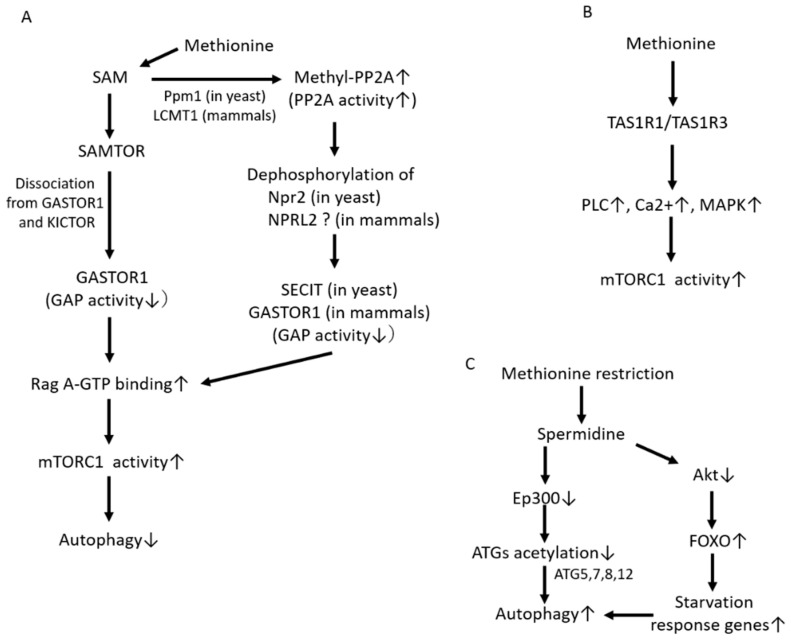 <img src="https://www.ncbi.nlm.nih.gov/pmc/articles/PMC7911310/bin/biomedicines-09-00130-g002.jpg" alt="An external file that holds a picture, illustration, etc.
<img src="https://www.ncbi.nlm.nih.gov/pmc/articles/PMC7911310/bin/biomedicines-09-00130-g002.jpg" alt="An external file that holds a picture, illustration, etc.
Object name is biomedicines-09-00130-g002.jpg"/> -
This is the 30 year old study that a lot of people have mentioned. In which there was a 43% increase in life span in rats.
The researchers make some obervations that are hard to reconcile with some parts of the bioenergetic viewpoint.
They measured GSH and GSSG levels and they were through the roof. In old mice GSH was 278% higher than in old control mice. Now GSSG did not change, meaning the GSH/GSSG ratio increased a lot.
Since the GSH/GSSG ratio is a proxy for the NAD/NADH ratio and for how oxidized the organism is, the mice should be in an extremely reductive state- yet they lived a lot longer and are healthy.The only place where GSH decreases was the liver and kidneys.
They also found that these changes were present as early as 2 months into the diet. While other research suggests that it might take 2-4 weeks for those changes to happen. I'm not sure if those changes would also occur on an intermittent approach, but I read there was a study on that, I just havent found it yet.
-
@Mauritio said in Methionine/Cysteine restriction increases longetivity AND energy expenditure:
Thanks.
I was tryign low fat, low protein yesterday as well.
And I feel like restricting two macro-nutrients is too much. not sure if I could handle that long term. If almost all you eat is carbs, you probably run into satiety problems down the road. Carbs just arent that filling IME. But maybe it would get easier over time, as the animal studies show a shift in substrate utilization towards carbohaydrate oxidation, so maybe the cravings are transitory.I have noticed I don''t crave fatty foods as much when I take pyrucet. I'm thinking the more you increase glucose oxidation, the less you fatty foods tasty. However I'm not sure the same can be said about protein.
-
Something interesting about all this to me is that before I recognized that I was hypothyroid, I ate a plant based diet, (heavy on fruits, but a fair amount of rice and potatoes) and ate a couple cheeseburgers once a week. Like vegan except for one day a week. I had previously been vegetarian exclusively for about 10 years, (which probably contributed to my hypothyroidism as I in no way avoided PUFAs, and did not consume dairy).
During that period when I first re-introduced beef once a week I have never been healthier. It actually still stands out in my mind as a time when I was incredibly well. I would imagine that I never got more than 75 grams of protein in a day, (6 days a week) and the majority of that would have been from plants, (squash, potatoes, bread, various fruits, some beans). I’m willing to bet with some very modest changes I could probably replicate that diet and fall into methionine restriction pretty easily.
-
@Mulloch94 said in Methionine/Cysteine restriction increases longetivity AND energy expenditure:
@Mauritio said in Methionine/Cysteine restriction increases longetivity AND energy expenditure:
Thanks.
I was tryign low fat, low protein yesterday as well.
And I feel like restricting two macro-nutrients is too much. not sure if I could handle that long term. If almost all you eat is carbs, you probably run into satiety problems down the road. Carbs just arent that filling IME. But maybe it would get easier over time, as the animal studies show a shift in substrate utilization towards carbohaydrate oxidation, so maybe the cravings are transitory.I have noticed I don''t crave fatty foods as much when I take pyrucet. I'm thinking the more you increase glucose oxidation, the less you fatty foods tasty. However I'm not sure the same can be said about protein.
It might be true. Im on day 3 and I crave protein slightly less than on day one, certainly not more. The studies show that when you restrict protein, you increase carb and fat oxidation. Fat actually more than carb.
-
@evan-hinkle said in Methionine/Cysteine restriction increases longetivity AND energy expenditure:
Something interesting about all this to me is that before I recognized that I was hypothyroid, I ate a plant based diet, (heavy on fruits, but a fair amount of rice and potatoes) and ate a couple cheeseburgers once a week. Like vegan except for one day a week. I had previously been vegetarian exclusively for about 10 years, (which probably contributed to my hypothyroidism as I in no way avoided PUFAs, and did not consume dairy).
During that period when I first re-introduced beef once a week I have never been healthier. It actually still stands out in my mind as a time when I was incredibly well. I would imagine that I never got more than 75 grams of protein in a day, (6 days a week) and the majority of that would have been from plants, (squash, potatoes, bread, various fruits, some beans). I’m willing to bet with some very modest changes I could probably replicate that diet and fall into methionine restriction pretty easily.
You mention you increased your protein and got healthier, how is that related to the protein restriction discussed in this thread? Wouldnt that be an argument against it?